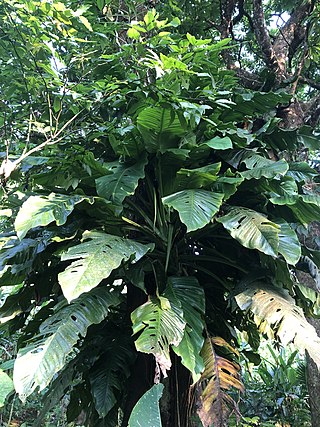
Monstera deliciosa, the Swiss cheese plant or split-leaf philodendron is a species of flowering plant native to tropical forests of southern Mexico, south to Panama. It has been introduced to many tropical areas, and has become a mildly invasive species in Hawaii, Seychelles, Ascension Island and the Society Islands. It is very widely grown in temperate zones as a houseplant.

Monstera is a genus of 59 species of flowering plants in the arum family, Araceae, native to tropical regions of the Americas.
Monstera tacanaensis is a species of flowering plant in the genus Monstera of the arum family, Araceae.
Monstera amargalensis is a flowering plant that belongs to the genus Monstera, and the family Araceae.

Monstera anomala is a flowering plant of genus Monstera and family Araceae.
Monstera barrieri is a flowering plant of the genus Monstera and family Araceae.
Monstera cenepensis is a species of flowering plants in the family Araceae.
Monstera costarisensis is a flowering plant in the genus Monstera and family Araceae.

Monstera egregia is a flowering plant belonging to genus Monstera of family Araceae.

Monstera glaucescens is a flowering plant in genus Monstera of the arum family, Araceae.
Monstera guzmanjacobiae is a species of plant in the family Araceae from Mexico.
Monstera integrifolia is a species of flowering plant in the genus Monstera in the arum family, Araceae.
Monstera juliusii is a flowering plant in the arum family (Araceae). It is native to high-altitude cloud forests of Costa Rica at altitudes of 1,600 to 2,250 metres and occasionally confused with Monstera standleyana. However, M. standleyana has green petioles, few fenestrations and thin leaves, while M. juliusii is characterized by mottled white petioles, frequent fenestrations at maturity and thick, leathery leaves. Mature plants have pinnatilobed leaves as long as 60 cm and 30 cm wide, with circular fenestrations close to the margins, and oval fenestrations near the midrib. The species is named after Julius Johnson, son of the artists Rashid Johnson and Sheree Hovsepian.
Monstera kessleri is a flowering plant in genus Monstera of the arum family Araceae.
Monstera lechleriana is a flowering plant in the genus Monstera in the arum family, Araceae. It is considered to be a rare plant. However, a section of plant owners grows them as houseplants. A lightly rooted stem cutting can cost upwards of $200.

Monstera lentii is a flowering plant in the genus Monstera in the arum family, Araceae.
Monstera limitaris is a flowering plant in the genus Monstera of the arum family (Araceae).
Monstera luteynii is a species of flowering plant in the genus Monstera of the arum family, Araceae.
Monstera minima is a species of flowering plant in the genus Monstera of the arum family, Araceae. Its binomial name minima refers to its tiny foliage, and it is indeed the smallest of the Monstera species when it comes to leaf size. It is most easily distinguished from other species in the genus due to the fact that its peduncles are much longer than its leaves.
Monstera molinae is a species of flowering plant in the genus Monstera in the arum family, Araceae.






